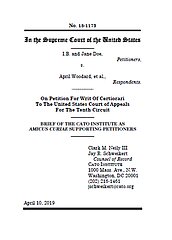I.B. and her mother filed suit against Woodard (and others), alleging violations of I.B.’s Fourth Amendment rights. But a divided panel of the Tenth Circuit held that the defendants were entitled to qualified immunity, because Woodard’s strip search did not violate “clearly established law.” The court failed to even resolve these questions on the merits, noting only that (1) there was a circuit split on whether a warrant was necessary in these circumstances, and (2) assuming a warrant wasn’t necessary, it was not “clearly established” whether this sort of strip search was permissible or not. This latter holding is particular shocking, because the Supreme Court itself recently addressed this exact subject matter — warrantless strip searches of children in schools — in Safford Unified School District No. 1 v. Redding. In Safford, the Court even said it was seeking “to make it clear” that an intrusive strip search of a child was justifiable only with “specific suspicions” that evidence of danger or wrongdoing will be found in the area searched. For this reason, Judge Briscoe dissented in part, and would have held that I.B.’s strip search violated “clearly established law,” as given inSafford.
The Tenth Circuit’s decision exemplifies everything that is perverse and unjust about qualified immunity. I.B. had her constitutional rights violated in an egregious manner, yet she was left without any remedy because of a fictitious doctrine, with no grounding in the text or history of Section 1983. The Tenth Circuit refused to even decide whether her constitutional rights were violated in the first place, and it applied the “clearly established law” test so strictly that a seemingly on-point Supreme Court case concerning nearly identical circumstances was still insufficient to overcome qualified immunity.
I.B. and her mother have therefore filed a cert petition, asking the Supreme Court to resolve the disputed Fourth Amendment questions at issue, but also to reconsider the doctrine of qualified immunity itself. Cato has filed an amicus brief in support of this petition, arguing that qualified immunity lacks any proper legal or historical basis, and that it is not entitled to respect under the doctrine of stare decisis. Ours is far from the only brief being filed today, however. We’ve also helped coordinate the drafting and filing of two additional amicus briefs: one on behalf of a group of leading qualified immunity scholars, and another on behalf of a diverse array of cross-ideological groups, all of whom share a common interest in ensuring that government officials are held accountable for their misconduct. These groups include, for example, the ACLU, the Alliance Defending Freedom, Americans for Prosperity, the Institute for Justice, the Law Enforcement Action Partnership, the NAACP, R Street, the Second Amendment Foundation, among many others.
This case represents a major development in Cato’s ongoing campaign to challenge qualified immunity. It presents the Supreme Court with a perfect opportunity to reconsider this egregious doctrine, and it brings together enough prominent voices that the call will be hard to ignore.



